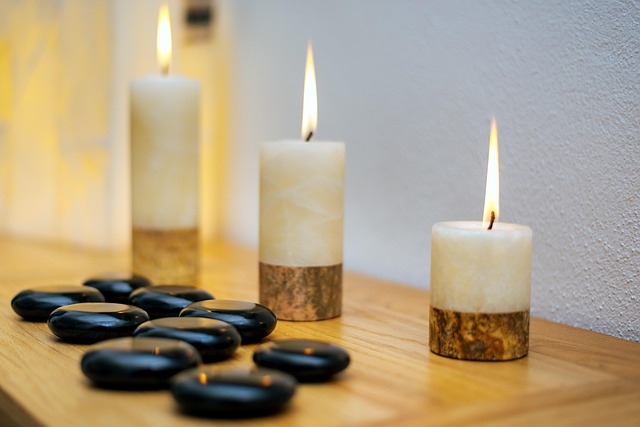Cold water immersion, such as cold showers or ice baths, stimulates endorphin release by mimicking the body's stress response, leading to reduced anxiety, improved mood, and natural pain relief. This practice has gained popularity as a holistic approach to managing stress and anxiety, offering mental clarity, enhanced physical endurance, and better sleep. Incorporating daily cold plunges, starting with 3-5 minutes, can be an accessible way to promote well-being; always consult a healthcare provider before starting new routines.
Boost your mental wellbeing with a refreshing approach to stress and anxiety relief: cold water immersion. This natural method has gained popularity for its ability to increase endorphin levels, often referred to as ‘feel-good’ hormones. In this article, we explore the science behind cold plunging and its profound impact on reducing stress and anxiety. Discover practical tips to incorporate this powerful technique into your daily routine and unlock a calmer, happier you.
Understanding Endorphins and Their Role in Stress and Anxiety Relief
Endorphins, often referred to as our ‘feel-good’ hormones, play a pivotal role in regulating our mood, reducing stress, and providing natural pain relief. They are produced by the brain and spinal cord and released in response to various stimuli, including physical exercise, pleasure, and even social connection. When we engage in activities that induce these feel-good chemicals, like taking a cold plunge, our bodies experience an uplift in overall well-being.
Cold water immersion, such as a cold shower or ice bath, has gained attention for its potential to stimulate endorphin release. The sudden exposure to cold triggers the body’s stress response, increasing heart rate and blood flow. This process can lead to the activation of endorphins, which not only reduce physical pain but also alleviate symptoms of stress and anxiety. By understanding this connection, individuals can harness the power of a cold plunge as a simple yet effective strategy to manage their mental health and promote a positive state of mind.
The Science Behind Cold Water Immersion and Its Impact on Endorphin Release
The practice of cold water immersion, often in the form of a cold plunge, has gained popularity for its potential health benefits, particularly in stress and anxiety relief. Scientifically, this method triggers a series of physiological responses in the body. When you immerse yourself in cold water, whether it’s ice-cold or just significantly cooler than your body temperature, it sends signals to your nervous system. This prompts a release of endorphins, often referred to as ‘feel-good’ hormones, which act as natural painkillers and mood lifters. The sudden exposure to cold is like a shock to the system, causing blood vessels to constrict and then dilate, increasing heart rate, and stimulating the release of these neurochemicals.
This process mimics the body’s natural stress response, but in a controlled manner. Endorphins, released during cold therapy, can counteract stress hormones like cortisol, leading to reduced anxiety and an improved sense of well-being. The immersive experience also promotes mental clarity and can enhance physical endurance by increasing blood flow and oxygen delivery to muscles once the immersion is over. This scientific understanding provides a basis for why many people turn to cold water immersions as a holistic approach to managing stress and anxiety.
Benefits of Cold Plunging for Mental Wellbeing
Cold water immersion, or cold plunging, has gained popularity as a natural way to boost mental wellbeing. When you immerse yourself in cold water, whether it’s an ice bath or even a cold shower, your body responds by releasing endorphins—often referred to as ‘feel-good’ hormones. This reaction can significantly alleviate stress and anxiety. The sudden exposure to cold triggers a variety of physiological changes, including increased heart rate and blood flow, which subsequently stimulate the release of endorphins into the bloodstream.
Beyond its physical effects, cold plunging can also improve mood and cognitive function. Many people report feeling more alert, focused, and calm after a cold water immersion session. This practice has been shown to reduce symptoms of depression and promote better sleep—both crucial aspects for maintaining good mental health. The mental clarity and sense of accomplishment that come with overcoming the initial shock of cold water can also boost self-esteem and confidence.
Practical Tips for Incorporating Cold Water Immersion into Your Routine
Incorporating cold water immersion into your routine is easier than you think. Start with a cold shower—even a brief one—in the morning to wake up your senses and boost circulation. For a deeper relaxation experience, try a cold plunge in a tub filled with ice water for 10-15 minutes after your workout or before bed. This can help alleviate stress and anxiety by stimulating the release of endorphins, often referred to as the body’s “feel-good” hormones.
To make it a habit, keep a bucket of ice water near your shower or invest in a cold therapy product designed for at-home use. Consistency is key; aim for 3-5 minutes of daily immersion, gradually increasing duration as you build tolerance. Remember, the goal is not to shock your system but to encourage a healthy response from it. Always listen to your body and consult with a healthcare provider before starting any new wellness routine, especially if you have existing health conditions or concerns.
Cold water immersion, or cold plunging, has been scientifically proven as an effective way to boost endorphin levels, offering a natural and powerful tool for managing stress and anxiety. By taking the leap into a cold body of water, you can unlock your body’s ability to release these feel-good chemicals, leading to improved mental wellbeing. Incorporating this simple yet transformative practice into your routine could be the key to navigating life’s challenges with enhanced resilience and a positive mindset. So why not give it a try and experience the benefits of a cold plunge for yourself?
